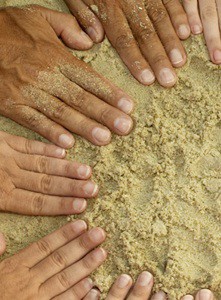Self-Injury – A guide for friends
- What is self-injury?
- Why is my friend self-injuring?
- How do I know if my friend is self-injuring?
- Your reaction to self-injury?
- How do I talk to my friend about self-injury?
- What do I do if my friend is self-injuring?
- Telling someone your friend self-injures?
- How should I tell someone else?
- Will my friend stop self-injuring?
- Where can I find more resources?
Non-suicidal self-injury (NSSI), also referred to as self-injury or self-harm, is the deliberate and direct destruction of one’s body tissue, without suicidal intent and not for body modification purposes. Therefore this definition does not include tattooing or piercing, and indirect injury such as substance abuse or eating disorders. Also, this type of self-injury is different than “self-injurious behaviors” (SIB) which are commonly seen among individuals with intellectual and developmental disabilities.
Self-injury methods
The most common methods of self-injury include cutting, burning, scratching, and  bruising. These injuries can range in severity from minor to moderate. Self-injury can start at any age, but most people who self-injure start when they are teenagers. Many people who start self-injuring in their teens continue into adulthood, while others may start self-injuring as adults. Although any one at any age may begin to engage in self-injury, research shows that the most common age of onset for self-injury is early adolescence, more than half of young adults who have engaged in self-injury recall starting at this time, however slightly less than a quarter recall starting before age 12.
bruising. These injuries can range in severity from minor to moderate. Self-injury can start at any age, but most people who self-injure start when they are teenagers. Many people who start self-injuring in their teens continue into adulthood, while others may start self-injuring as adults. Although any one at any age may begin to engage in self-injury, research shows that the most common age of onset for self-injury is early adolescence, more than half of young adults who have engaged in self-injury recall starting at this time, however slightly less than a quarter recall starting before age 12.
How common is it?
Between 14 to 24% of youth and young adults in the community report engaging in self-injury at least once in their life. Some studies have found even higher percentages if they provide comprehensive checklists that list many different types of self-injury methods, or if they advertise their study as one about self-injury.
Rates
14-24% of youth or young adults have self-injured at least once.
One quarter of those have done it many times.
 Research has shown that the most common reason for self-injury is to cope with difficult feelings (e.g., distress, anxiety, stress, sadness) or thoughts (e.g., being very self-critical). These feelings or thoughts are felt to be so intense and overwhelming that they are intolerable. People who self-injure frequently report that following the self-injury they experience a “relief” from these negative emotions/thoughts for a short time.
Research has shown that the most common reason for self-injury is to cope with difficult feelings (e.g., distress, anxiety, stress, sadness) or thoughts (e.g., being very self-critical). These feelings or thoughts are felt to be so intense and overwhelming that they are intolerable. People who self-injure frequently report that following the self-injury they experience a “relief” from these negative emotions/thoughts for a short time.
Some people self-injure to punish themselves if they feel they have done something wrong or if they are really hard on themselves.
Some people may self-injure to tell others how they feel (when it is hard to say it in words).
Some people may self-injure when they feel disconnected from others or even themselves; self-injury may let them feel something when they feel very numb or say they feel nothing at all.
Others will self-injure to avoid acting on thoughts or urges related to suicide.
There are many reasons why people self-injure. By talking to your friend, you may be able to get a better sense of why he/she is self-injuring and what he/she is going through, but sometimes even he/she will not be able to provide you with this information. Many people say that lots of these reasons are true for them, and the reason for the self-injury can change over time. It is complicated and while you may want to know “why”, it may often be difficult for your friend to really give one simple reason. Don’t worry if you cannot understand your friend’s self-injury. It is most important that your friend feels heard, supported and validated for sharing his/her struggle with you.
Sometimes it’s hard to know if a friend is self-injuring. For many people, self-injury is  secretive. It is hard to talk about – even with a close friend.
secretive. It is hard to talk about – even with a close friend.
This secrecy itself may be a signal that something is wrong – especially if this is out of the ordinary for your friend (e.g., you notice your friend doesn’t want to hang out with anyone any more).
Another important sign to look for is a significant change in your friend’s mood or behavior. If you notice that your friend is withdrawing from you or others and feeling down for a prolonged period of time, there may be something going on. As a friend, checking in to see what might be going on for your friend and expressing your concern is okay (we provide a few steps on how to bring up self-injury with your friend, below).
Often, when people self-injure, they experience more negative moods (e.g., sadness, stress, anxiety, frustration); they may also become more distant.
Here are a few other possible signs of non-suicidal self-injury that are important to be aware of:
1. Unexplained cuts, burns or bruises; these typically occur on the arms, legs and stomach.
2. Finding razors, knives or other items that may be used to self-injure.
3. Noticing that your friend is spending less time with you, other friends, or family members, and there is no real reason for this. They may spend much more time alone, may not answer your calls, or may not respond to your texts like they used to.
4. Noticing that your friend is wearing clothing that doesn’t quite match the weather (e.g., wearing a long-sleeved shirt and pants on hot summer days). Your friend may be hiding scars, wounds, or bruises by wearing clothing or bracelets that cover body parts where he or she self-injures.
These signs do not mean that your friend is definitely self-injuring, just that he/she might be. You should talk with your friend if you suspect self-injury, as something else besides self-injury could be going on.
 Finding out that your friend is self-injuring can be very difficult. Common reactions include:
Finding out that your friend is self-injuring can be very difficult. Common reactions include:
– Being very worried and concerned about your friend.
– Being confused about why your friend is self-injuring; you may also have questions about non-suicidal self-injury (e.g., what exactly it is, why it’s done and what you can do to help your friend)
– Being shocked and/or horrified.
– Feeling angry and/or frustrated or thinking they are just doing this for attention.
– Feeling conflicted about whether you should tell someone or keep your friend’s self-injury a secret.
– Feeling helpless because you don’t know where to go or who to turn to.
– Feeling sad and empathizing with your friend.
These are all VERY normal reactions to have.
This can be a difficult and confusing time. If you are under the age of 18, the most helpful and caring thing you can do is to tell someone you trust.
You cannot stop your friend from self-injuring on your own, but you can support them in getting help.
Here are a few things that may be helpful when talking about self-injury with your friend:
1. Choose a good time to speak with your friend. It is best to talk privately in a place where you can both be comfortable and calm.
2. Be honest with your friend about how worried you are.
3. Be aware of how you feel. If you feel really upset, it may not be a good time to have the conversation and you may need to take some time for yourself first. It is important to remain calm and avoid reacting strongly because it was probably very difficult for your friend to tell you in the first place.
4. Focus the conversation on your friend’s feelings and emotions, rather than his/her self-injury.
5. Do not judge your friend or make threats (e.g., they have to stop or else you won’t talk to them anymore). Your friend has come to you because they trust that you will be supportive during this difficult time.
6. Do not promise your friend that you can keep his/her self-injury a secret. Make sure your friend knows that you are worried, you care about him/her, and that it is important to you that they stay safe and get help. You cannot stop someone from self-injuring, but you can help them find someone who can provide the professional support they need.
7. Don’t be afraid to ask your friend questions about his/her self-injury but don’t put the pressure on. Some people have difficulty talking about it. Expressing your support and helping your friend find someone they feel comfortable talking to is most important.
8. Understand that people do not self-injure just for attention or “drama”, if they are doing this they need to be taken seriously and supported. This can be difficult at times, but it is important to not dismiss your friend’s self-injury as unimportant, manipulative or attention-seeking
If your friend does not want to talk about it, that’s okay. It can be difficult at first. Continue to let your friend know that he/she is not alone and that you are there to support him/her. Let your friend know that you are concerned and that you will be there to listen when they are ready.
1. Encourage your friend to seek help. If your friend is under 18 years old, this  should be from a trusted adult or mental health professional. You can work together to decide who you will tell and where your friend may go to seek help. Some tips on how to do this are provided on the following page.
should be from a trusted adult or mental health professional. You can work together to decide who you will tell and where your friend may go to seek help. Some tips on how to do this are provided on the following page.
2. If your friend is at immediate risk of hurting themselves in a life-threatening way, take him/her to the hospital. If your friend is not at immediate risk, talk to your friend about the next steps and who you may tell about his/her self-injury. If your friend has already hurt him/herself and you are concerned about the injury, take him/her to the hospital to ensure that the injury is well cared for.
3. DO NOT ignore your friend. Self-injury is most often a sign of distress and this means that they are in great need of a friend.
4. Listen to what your friend says and how your friend feels.
5. Communicate your support and let your friend know that he/she is not alone. Know that you cannot stop your friend from self-injuring, but that you can play an important role in supporting your friend as your friend works to stop self-injuring or as he/she goes through treatment .
6. Treat your friend as you normally would. Continue to do things that you like to do together. He/she has not changed and is still the same person as he/she was before.
7. Learn more about non-suicidal self-injury. The more you know about non-suicidal self-injury, the better you will be able to support your friend. Some helpful resources are outlined on the last page.
8. Continue to support your friend throughout their efforts to stop self-injuring and/or through treatment.
9. Be sure to take care of your own emotional well-being. Supporting a friend who self-injures can be difficult, so make sure that you also have some good supports in place and that your friend who self-injures knows who you may be talking to (e.g., do not gossip or talk to other peers about your friend’s self-injury without his/her permission). You may want to talk to a mental health professional to help you with your own emotional struggles, as many friends of those who self-injure do. This is a difficult time for your friend, and also a difficult time for you.
If your friend is under 18 years old, telling an adult that your friend is  self-injuring is very important but it can also be very difficult.
self-injuring is very important but it can also be very difficult.
It is difficult for your friend who may feel upset about it; they may also feel embarrassed, guilty, or ashamed. It is also difficult for you because you may feel like you’re betraying your friend by telling someone else, even though it is to help your friend get the support they need.
So, when choosing someone to tell about your friend’s self-injury:
Choose someone your friend trusts.
Choose someone who will be able to guide your friend to the professional resources he/she needs.
If your friend is open to seeking help, talk it out with him/her and come up with a few options.
Here are some examples of individuals you may want to tell:
- A parent
- A mental health professional
- A family doctor
- A close relative
- A teacher, guidance counselor, school social worker or nurse
If your friend is open to seeking help, keep your friend as involved in the process as possible and let your friend know that you will be there to support him/her.
If your friend is under 18 years old, and is going to tell a trusted adult, it can help to be with your friend when he/she tells that person. Let the trusted person know how difficult this is to talk about and that this is something you want kept private.
If your friend does not want you to tell anyone, let your friend know that you care about him/her.
If your friend is under 18 years old, let your friend know that you aren’t able to keep this a secret. You can help support your friend but you can’t do it all on your own. Be honest with your friend and let your friend know who you will be telling.
A friend may become angry with you, but that is okay. In the long-run, your friend’s safety and health is what matters most. Most friends will understand this with some time.
Self-injury is not a life-sentence. People CAN and DO STOP self-injuring. However, the longer your friend self-injures, the more difficult it can be to stop. It is important to remember that stopping a behavior that has become a frequently used unhealthy coping strategy will take time and effort and having a supportive friend can be helpful.
As discussed above, people who self-injure do it in private and work very hard to keep it a secret. Some people who self-injure will tell one or two close friends or family members; often they will tell other self-injurers online. Other people who self-injure will talk to a professional (like a counsellor, psychologist or a doctor) about their self-injury.
It is important that people who self-injure receive helpful resources and, if they are open to it, professionals who can support them in their efforts to cope better. Mental health professionals (such as counsellors, social workers, psychologists and psychiatrists) are trained to help people learn healthier ways to cope, and can be helpful in supporting a friend who self-injures.
People who self-injure cannot be forced to stop. Sometimes people who self-injure do not want to stop self-injuring. Remember that self-injury serves a purpose and stopping can be difficult. When people who self-injure start learning healthy ways to cope, then they find stopping self-injury easier.
You cannot force your friend to stop self-injuring;
with support, however, many people will choose to stop.
These resources are recommended for anyone who has self-injured who wants to learn more about it and learn more about recovery.
Books
Gratz, K.L., & Chapman, A.L. (2009). Freedom from self-harm: Overcoming self-injury with skills from DBT and other treatments. Oakland: New Harbringer.


